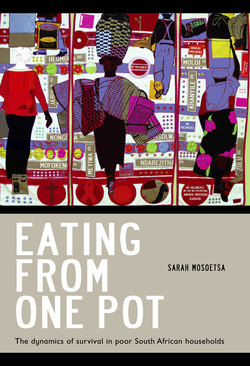Eating from One Pot

Реклама. ООО «ЛитРес», ИНН: 7719571260.
Оглавление
Sarah Mosoetsa. Eating from One Pot
Contents
FOREWORD
ACKNOWLEDGEMENTS
INTRODUCTION
SOCIAL WELFARE IN POST-APARTHEID SOUTH AFRICA
CALLS FOR THE INTRODUCTION OF A BASIC INCOME GRANT
Poverty and unemployment in KwaZulu-Natal
The tale of Enhlalakahle and Mpumalanga townships
Conducting research in Mpumalanga and Enhlalakahle
Chapter 1 ‘Sharing the little I have with my family’: the allocative rules of household resources and income
CLUSTERING OR OVERCROWDING?
HIDING POVERTY, HIDING DISEASE: THE POWER OF RURAL TIES
HOUSEHOLD ‘INCOME POOLING’ AND EXPENDITURE
ESSENTIAL SERVICES: HOUSEHOLD ACCESS AND EXPENDITURE
BEYOND CAPITALIST COMMODITY PRODUCTION
Social reproduction: women vs. men
Shift from wage goods to subsistence production
Petty commodity production: working in the informal economy
THE FLUIDITY OF POVERTY
An ‘improving’ household: the Zondi family5
A ‘coping’ household: the Mazibuko family6
A declining household: the Mhlongo family7
SOME CONCLUSIONS
Chapter 2 ‘My wife does not respect me anymore’: unequal power dynamics in households
RE-IMAGINING THE DOMESTIC AS A SITE OF STRUGGLE
Shifting gender roles: the ‘end of patriarchalism’?
De facto heads of households and breadwinners: the micro-political relations of control
FRACTURED SOCIAL RELATIONS I: INCOME AND TIME CONFLICT
ALCOHOL AND DRUG ABUSE
FRACTURED SOCIAL RELATIONS II: DOMESTIC VIOLENCE
INTER-GENERATIONAL CONFLICT
Chapter 3 ‘I remain an ANC member, but…’: civil society in Mpumalanga and Enhlalakahle
THE POST-APARTHEID STATE: FROM LABOUR TO WELFARE POLICIES
POST-APARTHEID TOWNSHIPS
Membership of community organisations
The end of monetary contributions
The crisis of representation
The new challenges facing political organisations
The end of social movement unionism and the crisis of social institutionalism
Faith-based organisations: responding to new crises
The Manyano Women’s Christian Movement
The ministers’ fraternity
NEW COMMUNITY-BASED ORGANISATIONS AND THE NEW CRISES
The emergence of Concerned Citizens Groups
Mpumalanga Concerned Citizens Group
The Concerned Citizens of Enhlalakahle
Home-based care: volunteerism in the community
An interview with Mrs Gwala
SOME CONCLUSIONS
Chapter 4. Theoretical and Policy Implications
THE LIVELIHOODS APPROACH AND FRAMEWORK. Introduction
Labour and work in the livelihoods framework
The idea of capital in the livelihoods framework
SOCIAL CAPITAL
Human capital
PHYSICAL CAPITAL
FINANCIAL CAPITAL
SHORTFALLS OF THE LIVELIHOODS FRAMEWORK
IMPLICATIONS OF THE STUDY OF HOUSEHOLD ECONOMIES IN MPUMALANGA AND ENHLALAKAHLE FOR POLICY IN POST-APARTHEID SOUTH AFRICA
HAS ANYTHING CHANGED SINCE THE STUDY OF HOUSEHOLD ECONOMIES IN MPUMALANGA AND ENHLALAKAHLE WAS CARRIED OUT?
CONCLUSION. Poor households are fragile sites of stability
SELECTED BIBLIOGRAPHY. Books, Articles and Theses
Government Documents
Newspaper Articles
Index. A
B
C
D
E
F
G
H
I
J
K
L
M
N
O
P
R
S
T
U
W
Y
Z
Отрывок из книги
EATING FROM ONE POT
The dynamics of survival in poor South African households
.....
Source: Statistics South Africa (1996, 2001c)
Mpumalanga was established in the late 1960s. By 2001, the township had 26 535 residents, the majority of whom lived in 5 328 formal dwellings. 4 377 households had running water while 4 899 used electricity for lighting. As will be shown in later chapters, though, many residents are unable to pay for these services. Illegal electrical connections are rife, and many households have resorted to cheaper forms of energy. The number of households using electricity in Enhlalakahle actually declined by 27,9 per cent between 1996 and 2001, while the number of households using candles increased from 431 to 675 (a 56,6 per cent increase). The number of households with indoor running water decreased by 39,4 per cent in the same period.
.....